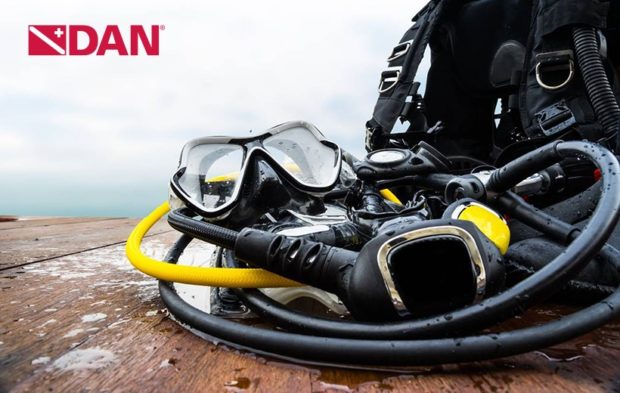DAN Encourages Divers and Dive Operators to Disinfect Gear Properly

Update – April 24, 2020 – The CDC has updated its recommendations, and some of the cleaning products noted in this article may not be suitable for killing the virus that causes COVID-19. While Steramine is an effective sanitizing product, and some manufacturers recommended it for use on dive gear, it does not appear on the EPA’s “List N” and is thus not endorsed for removal of the new coronavirus. For a more up-to-date article that’s specific to COVID-19, go to Disinfection of Scuba Equipment and COVID-19.
In light of the recent outbreak of the novel coronavirus (COVID-19), questions have arisen in the dive community about disease transmission when using rental equipment, especially regulators. With the threat of coronavirus on everyone’s minds, divers want to know what precautions are being taken against the spread of disease. Properly sanitizing equipment is paramount. Keep the following in mind:
According to the CDC, household cleaners are as effective against COVID-19 as they are against the common cold and flu viruses. Therefore, cleaning and disinfecting equipment meant for personal use (such as second-stage regulators, masks, snorkels and BCD oral inflators) is very important.
Equipment can be effectively sanitized by submerging it in a 10% bleach solution or using a cleaning product such as Steramine™ tablets or any other quaternary ammonium compound. Be sure to use these products according to the manufacturer’s directions and then rinse the equipment with fresh water.
Products that are commonly used to clean dive gear but are ineffective against coronavirus include antibacterial and chlorhexidine mouthwashes or sprays. Hot soapy water must be paired with mechanical action such as scrubbing with a soft toothbrush to be effective.
If you’re a diver using rental gear and would like to take extra steps to protect yourself from transmissible diseases, thoroughly wipe the following equipment with a household disinfecting wipe and then rinse with fresh water before use:
- Regulator mouthpiece
- Snorkel
- BCD oral inflator
- The inside of your mask
If you do not have access to wipes, you may wish to ask the shop you’re diving with to properly sanitize the equipment before you take it with you.
For a list of household cleaning products effective against the coronavirus, see the American Chemistry Council Center for Biocide Chemistries’ list of products that have an “emerging viral pathogen claim” from the Environmental Protection Agency. When using a household cleaning product, it might be prudent to change the active ingredient every so often to avoid breeding resistant strains.
As always, frequent hand-washing (with soap for at least 20 seconds), regularly cleaning high-traffic objects and areas (bathrooms, door handles, countertops, etc.), avoiding contact with people who are sick, and staying home when you are ill are some of the best ways to stop the spread of disease. For more information, see the CDC’s coronavirus page.
You can also check out the EPA’s diving safety manual for its guidelines on decontaminating scuba equipment.
For more information, email RiskMitigation@DAN.org
About DAN: The world’s most recognized and respected dive safety organization, Divers Alert Network (DAN) has remained committed to the health and well-being of divers for 40 years. The organization’s research, medical services and global-response programs create an extensive network that supports divers with vital services such as injury prevention, safety and educational programs and lifesaving evacuations. Every year, hundreds of thousands of divers around the world look to DAN as their dive safety organization. Join the DAN community or learn more at DAN.org.







